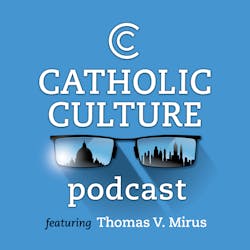Jun 30, 2025
St. Hildegard of Bingen,
12th-century abbess, mystic, polymath, and Doctor of the
Church, is best known to non-Catholics for something else – her
music. We have more pieces of music by Hildegard than by any other
medieval composer whose name we know. Her chants are beautiful,
otherworldly, virtuosic and ahead of their time. Some of them were
written for her morality play, the Ordo virtutum, which is
also the first of its kind. Musicologist Margot Fassler joins the
podcast to discuss what makes St. Hildegard’s music so special.
This episode is a crossover with Way of the
Fathers, where Dr. Jim Papandrea has done two episodes introducing
St. Hildegard’s life and writings. Make sure to listen to those for
more context about St. Hildegard.
Links
Way of the Fathers episodes on St. Hildegard’s
life and works:
https://www.catholicculture.org/commentary/512-st-hildegard-bingen-multimedia-visionary/
https://www.catholicculture.org/commentary/513-st-hildegard-bingen-teutonic-prophetess/
St. Hildegard’s letter to the Prelates of
Mainz
https://digfir-published.macmillanusa.com/mckay11eepages/mckay11eepages_ch9_4.html
Margot Fassler, Cosmos, Liturgy, and the
Arts in the Twelfth Century: Hildegard’s Illuminated Scivias
https://www.pennpress.org/9781512823073/cosmos-liturgy-and-the-arts-in-the-twelfth-century/
All music used with permission from Benjamin
Bagby & Sequentia, who have recorded her complete works. The
specific pieces in this episode can be found on the albums Ordo
Virtutum, Symphoniae, and Voice of the Blood.
https://www.sequentia.org/projects/hildegard.html
DONATE to make this show possible! http://catholicculture.org/donate/audio
SIGN UP for Catholic Culture’s
newsletter: https://www.catholicculture.org/newsletters








